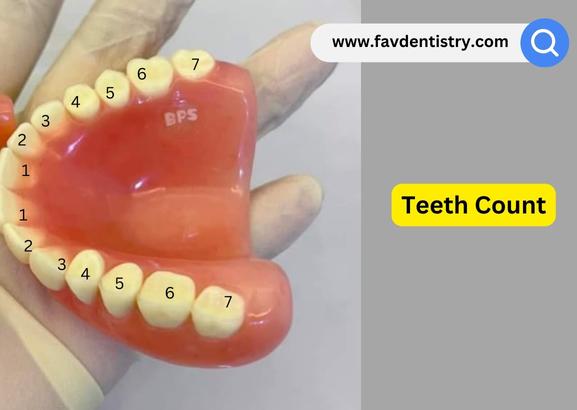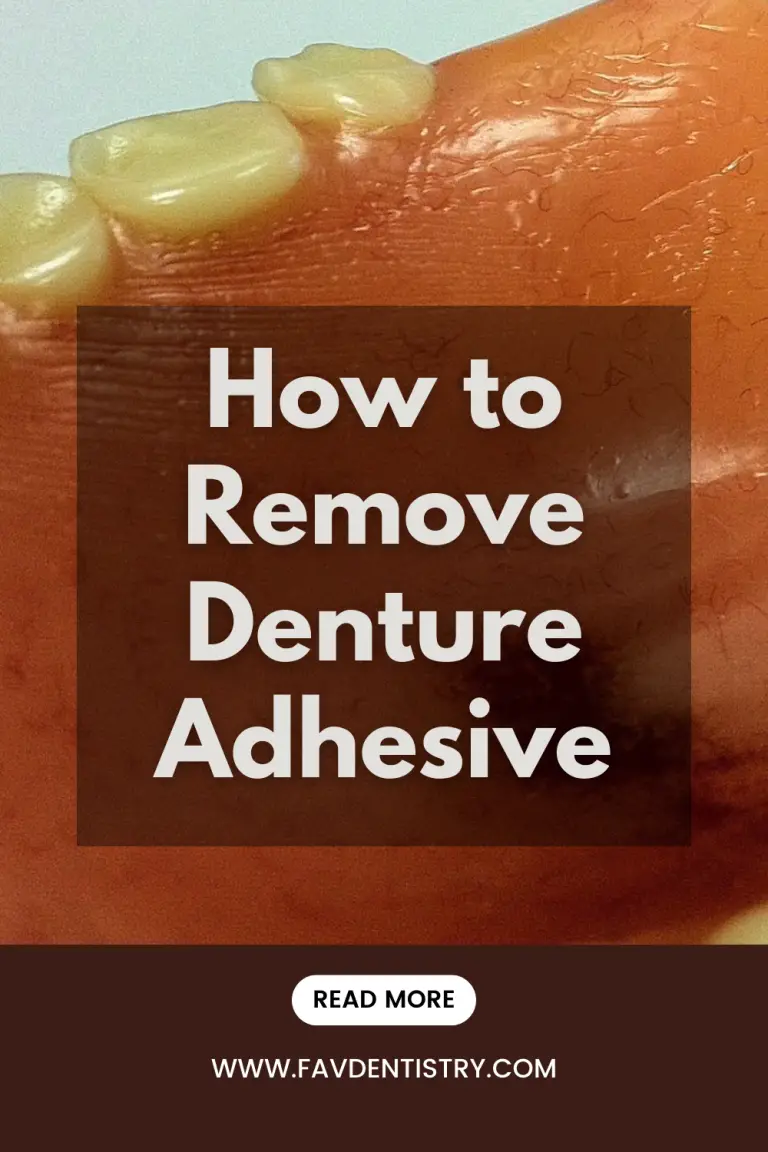How Many Teeth Does a Set of Dentures Have?
Last Updated on 6 months by DR. ALBIN SIPES
A set of dentures has 28 to 32 teeth, mimicking the natural teeth in an adult’s mouth. Dentures are custom-made replacements for missing teeth and surrounding tissues.
They are usually made of acrylic or a combination of metals and acrylic. Dentures can be full or partial, depending on whether the person is missing all their teeth or a few. They are removable prosthetic devices that rest on the gum tissue. Which is held in place by suction or with the help of adhesives.
Dentures not only improve the appearance of a person’s smile but also help with speaking and eating. In this article, we will explore-
- the different types of dentures
- their composition
- how they can benefit individuals with missing teeth.

Understanding Dentures
Dentures are a solution for individuals who have lost their natural teeth due to various reasons. Whether it’s age-related tooth loss, dental decay, or an accident that caused significant damage, dentures can help restore the appearance and functionality of a full set of teeth.
Understanding how dentures work and the functionality they provide is essential for those taking this dental treatment option.
What Are Dentures?
- Dentures are removable appliances that serve as a replacement for missing teeth and surrounding tissues.
- They are custom-made to fit each individual’s mouth, ensuring a comfortable and secure fit.
- Dentures can be either complete, replacing all teeth in the upper and lower jaw, or partial, replacing only a few missing teeth.
How Do Dentures Work?
- Dentures rely on the surrounding soft and hard tissues in the mouth for support and retention.
- They are constructed using materials such as acrylic, metal, or nylon, which provide strength and durability.
- Dentures can be easily inserted and removed by the wearer, allowing for convenient cleaning and maintenance.
The Functionality Of Dentures
- Dentures provide the ability to chew and eat a wide range of foods, improving overall nutrition and quality of life.
- They give individuals the confidence to smile, speak, and interact with others, enhancing self-esteem and social interactions.
- Dentures also help support facial muscles, preventing the sagging and sunken appearance often associated with tooth loss.
Dentures offer a practical and effective solution for those who have lost their natural teeth. From restoring the ability to eat comfortably to enhancing aesthetic appearance, dentures play a vital role in maintaining oral health and overall well-being.
Denture Teeth: Facts And Figures
The Anatomy Of Denture Teeth
Denture teeth are an essential component of removable dentures. It provides both functional and aesthetic benefits to individuals who have lost their natural teeth. Understanding the anatomy of denture teeth can help you appreciate the meticulous design and craftsmanship involved in creating a set of dentures.
Here are the key points about the anatomy of denture teeth:
- Denture teeth are made from acrylic or porcelain materials that mimic the natural appearance of teeth.
- They are carefully shaped to resemble the size, shape, and arrangement of natural teeth, ensuring a realistic and natural-looking smile.
- Denture teeth come in various shades and colors, allowing for customization to match your natural teeth or desired aesthetic.
- They are securely processed onto the denture base, ensuring stability and durability during daily use.
Types Of Denture Teeth
When it comes to denture teeth, there are different types available to meet individual needs and preferences. Here are the main types of denture teeth, along with their features and advantages:
- Porcelain denture teeth: Porcelain teeth are known for their natural appearance and ability to reflect light like natural teeth. They are highly wear-resistant and provide excellent aesthetics, making them a popular choice among denture wearers.
- Acrylic denture teeth: Acrylic teeth are more affordable and easier to adjust and repair compared to porcelain teeth. They are an excellent choice for individuals who prioritize cost-effectiveness and ease of maintenance.
- Composite denture teeth: Composite teeth are made from a mixture of acrylic and other materials, offering the advantages of both porcelain and acrylic teeth. They are durable, stain-resistant, and provide excellent chewing functionality.
How Many Teeth Are In A Full Set Of Dentures?
The number of teeth in a full set of dentures can vary depending on the individual’s specific needs and oral anatomy. Here are the key points about the number of teeth in a full set of dentures:
- A complete set of dentures typically consists of 28 teeth, including 14 teeth in the upper arch and 14 teeth in the lower angle.
- In some cases, individuals may require partial dentures, which replace only a few missing teeth. The number of teeth in partial dentures will depend on the extent of tooth loss.
- Dental professionals will assess your oral condition and recommend the appropriate number of teeth for your dentures, ensuring optimal function, comfort, and aesthetics.
Whether you’re considering dentures or already wearing them, understanding the anatomy and different types of denture teeth can help you make informed decisions about your oral health. Consult with a dental professional to determine the best option for your specific needs and enjoy the benefits of a confident smile and improved functionality.
Factors Affecting The Number Of Teeth
Dentures are a standard solution for those who have lost some or all of their natural teeth. But have you ever wondered how many teeth are in a set of dentures? The number of teeth in dentures can vary depending on various factors that are considered during the denture creation process.
In this section, we will explore the key factors that affect the number of teeth in a set of dentures.
The Role Of Dentist’s Recommendation
When it comes to determining the number of teeth in dentures, the recommendation of a dentist plays a crucial role. Dentists are highly skilled professionals who take into account several factors to determine the appropriate number of teeth for each individual.
They assess factors such as the patient’s oral health, facial structure, jawbone density, and overall dental needs.
Considerations In Determining The Number Of Teeth
During the denture creation process, several considerations are taken into account to determine the number of teeth. Here are some key points to consider:
- Oral health: The condition of the remaining natural teeth, if any, as well as the overall health of the gums and supporting tissues, are important factors in determining the number of teeth in dentures.
- Facial structure: The shape and structure of an individual’s face are considered when determining the number of teeth in dentures. The goal is to create a set of dentures that looks natural and complements the facial features.
- Esthetic preferences: Patient preferences about the appearance of their dentures are also taken into consideration. Some individuals may prefer a fuller smile with more teeth, while others may opt for a more natural and subtle look.
The Influence Of Jaw Structure On Teeth Count
Another crucial factor that affects the number of teeth in dentures is the individual’s jaw structure. Here are some points to consider:
- Jaw size: The size of the jaw plays a role in determining the number of teeth in dentures. A larger jaw may accommodate more teeth, while a smaller jaw may require fewer teeth or a different configuration.
- Bite alignment: The alignment of the upper and lower jaws, as well as the way the teeth come together when biting, can impact the number of teeth in dentures. It is important to ensure proper alignment for optimal comfort and functionality.
The number of teeth in a set of dentures is determined based on various factors. Dentist recommendations, along with considerations related to oral health, facial structure, and jaw size, all contribute to creating dentures that are both functional and aesthetically pleasing.
If you are considering dentures, it is essential to consult with your dentist to determine the best number of teeth for your individual needs.
Common Misconceptions About Dentures And Teeth Count
Myth: More Teeth Means Better Chewing Ability
Contrary to popular belief, having more teeth in a set of dentures does not necessarily translate to better chewing ability. The number of teeth in dentures can vary depending on the individual and their specific oral needs. While some dentures may have a full set of teeth, others may only replace certain missing teeth.
The key to effective chewing with dentures lies in their proper fit and functionality rather than the sheer number of teeth.
Here are some key points to consider:
- Chewing ability depends on the denture’s stability and how well it aligns with the natural jaw structure.
- Dentures with improper fit can cause discomfort and difficulty while chewing, even if they have a higher number of teeth.
- Dentists carefully consider the individual’s oral condition and specific needs before determining the appropriate number of teeth for their dentures.
- Modern dentures are designed to provide improved functionality, allowing individuals to enjoy a relatively normal diet and chew with ease, regardless of the number of teeth in the set.
Myth: Denture Teeth Are The Same As Natural Teeth
Another common misconception is that denture teeth are the same as natural teeth. While denture teeth mimic the shape, color, and general appearance of natural teeth, there are significant differences that should be acknowledged. Understanding these differences can help manage expectations and enhance the overall denture-wearing experience.
Consider the following points:
- Denture teeth are made from materials like acrylic or porcelain, which are designed to be strong, durable, and aesthetically pleasing.
- Unlike natural teeth, denture teeth are not connected to the jawbone. They rely on the support of the denture base and adhesive for stability.
- Denture teeth may have slight variations compared to natural teeth, such as a straighter alignment or a smoother surface, to facilitate better chewing and speaking with the dentures in place.
- It is important to note that denture teeth may not have the same sensation as natural teeth. It can make it harder to detect temperature changes or pressure while eating.
Debunking The False Teeth Count Beliefs
Now, let’s debunk the false beliefs surrounding teeth count in dentures. It’s essential to understand the truth behind this topic to make informed decisions regarding one’s oral health. So, let’s dive in:
- Myth: More teeth mean better chewing ability.
- Reality: chewing ability relies on denture stability and alignment rather than the number of teeth.
- Myth: Denture teeth are identical to natural teeth.
- Reality: denture teeth are made from different materials, have variations in appearance, and lack the connection to the jawbone.
- Dentists evaluate each individual’s oral condition before determining the appropriate number of teeth for dentures.
- Denture teeth are carefully designed to provide improved functionality, allowing individuals to enjoy a relatively normal diet and chew with ease.
By understanding these common misconceptions, you can have realistic expectations and optimize your denture-wearing experience. Remember, your dentist is your best resource for comprehensive guidance tailored to your specific needs. So, embrace the facts and make informed choices to preserve your oral health.
Choosing The Right Number Of Teeth For Dentures
Dentures are a common solution for people who have lost their natural teeth and want to restore their smile and chewing ability. If you’re considering dentures, one important decision to make is choosing the correct number of teeth for your set.
Analyzing functional requirements, considering the patient’s preference and facial structure, and following some top tips can help you make an informed decision. Let’s dive into these key factors to ensure you select the optimal number of teeth for your dentures.
Analyzing Functional Requirements
- Dentures should be able to provide sufficient biting force for chewing different types of food.
- The number of teeth in dentures should be determined by the individual’s chewing needs and preferences.
- Proper alignment and distribution of teeth are essential for a practical and comfortable bite.
- Functional requirements also include the ability to speak clearly and maintain proper oral hygiene.
Considering Patient’s Preference And Facial Structure
- The appearance of dentures can have a significant impact on a person’s self-esteem and confidence.
- Patients should consider their personal preference regarding the number of teeth, as different options can affect their facial aesthetics.
- Facial structure, such as the shape of the jaws and lips, should be taken into account while selecting the number of teeth for dentures.
- A skilled dentist or prosthodontist can guide by considering a patient’s facial features and desired outcome.
Top Tips For Optimal Teeth Selection
- Collaborate with your dentist to determine the functional requirements and your aesthetic goals.
- Discuss the pros and cons of different tooth options, such as full dentures, partial dentures, implant-supported dentures, or opportunities for edentulous arches.
- Consider the longevity and maintenance requirements of different types of dentures.
- Review examples and photographs of denture options to make an informed decision.
- Remember that regular dental check-ups and necessary adjustments are crucial for the continued comfort and performance of your dentures.
Choosing the right number of teeth for dentures is an important step in achieving a comfortable and functional smile. By analyzing functional requirements, considering patient preferences and facial structure, and following these top tips, you can ensure that your dentures provide the optimal solution for your oral needs.
Remember to consult with a dental professional for personalized advice tailored to your specific circumstances.
Maintaining Proper Teeth Count
Dentures are an essential dental solution for individuals who have lost all or most of their natural teeth. Whether it’s due to age, decay, or any other reason, dentures provide the ability to restore a complete set of teeth and regain confidence in their smile.
But have you ever wondered how many teeth a set of dentures actually have? Here are some suggestions-
Importance Of Regular Dental Check-Ups
Regular dental check-ups are crucial for denture wearers to ensure their oral health is in optimal condition. These appointments allow dentists to assess the current teeth count and make necessary adjustments if any teeth are missing or damaged. Here are key points about the importance of regular dental check-ups:
- Visiting a dentist regularly helps to maintain the correct number of teeth in dentures.
- Dentists have the expertise to identify any missing or damaged teeth.
- Regular check-ups ensure that denture wearers enjoy properly fitting dentures for maximum comfort while eating and speaking.
- Dentists can assess the overall health of the mouth and detect any underlying issues, such as gum disease or infections.
Replacing Damaged Or Missing Teeth
Missing or damaged teeth can significantly affect the functionality and appearance of dentures. It is essential to replace these teeth promptly to maintain proper teeth count. Here are key points regarding replacing damaged or missing teeth:
- Damaged or missing teeth can lead to difficulties in chewing and speaking effectively.
- Replacing damaged or missing teeth improves the overall aesthetics of the dentures.
- Dentists can provide suitable options for replacing teeth, such as partial dentures or dental implants.
- Promptly addressing damaged or missing teeth prevents any further complications or discomfort.
Proper Denture Care For Longevity
Proper denture care plays a vital role in ensuring the longevity of dentures and maintaining the ideal teeth count. Denture wearers should follow these guidelines for optimal care:
- Remove and clean dentures daily to prevent the buildup of plaque and bacteria.
- Use a soft-bristled toothbrush or denture brush to clean dentures gently.
- Soak dentures in a denture solution overnight to keep them moist and prevent warping.
- Avoid using hot water or abrasive cleaners that can damage dentures.
- Handle dentures with care to prevent accidental breakage or damage.
By adhering to these care practices and attending regular dental check-ups, denture wearers can enjoy a complete set of teeth, improved oral health, and a confident smile. Remember, maintaining the proper teeth count is essential for the overall functionality and aesthetics of dentures.
So, prioritize your oral health and ensure that your dentures are in top-notch condition.
Frequently Asked Questions Of How Many Teeth Does A Set Of Dentures Have
How Many Teeth Are In A Set Of Dentures?
A traditional set of dentures typically contains a full set of 32 teeth, including incisors, canines, premolars, and molars.
Can You Customize The Number Of Teeth In Dentures?
Yes, dentures can be customized to fit your unique needs, including the number of teeth. Your dentist can help determine the ideal number for you.
Are There Options For Partial Dentures With Fewer Teeth?
Absolutely! Partial dentures can be designed to replace only a few missing teeth, providing functionality and restoring your smile.
Conclusion
With a full understanding of how many teeth a set of dentures has, you can confidently navigate the process of getting dentures and maintaining them. Whether you opt for a full set or partial dentures, the number of teeth will depend on the number of missing teeth you have.
Dentures are custom-made to fit your mouth, providing a natural-looking smile. Remember to properly care for your dentures by cleaning them daily and avoiding harmful habits like chewing on hard objects or using them to open packages. Regular dental visits are essential to ensure the health and longevity of your dentures.
By following these recommendations, you can enjoy the benefits of dentures and confidently showcase your beautiful smile once again. Don’t hesitate to consult your dentist for any further questions or concerns regarding dentures.


